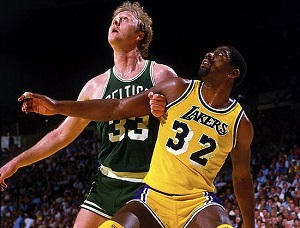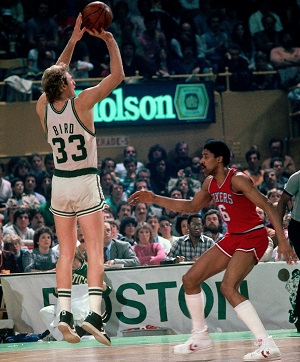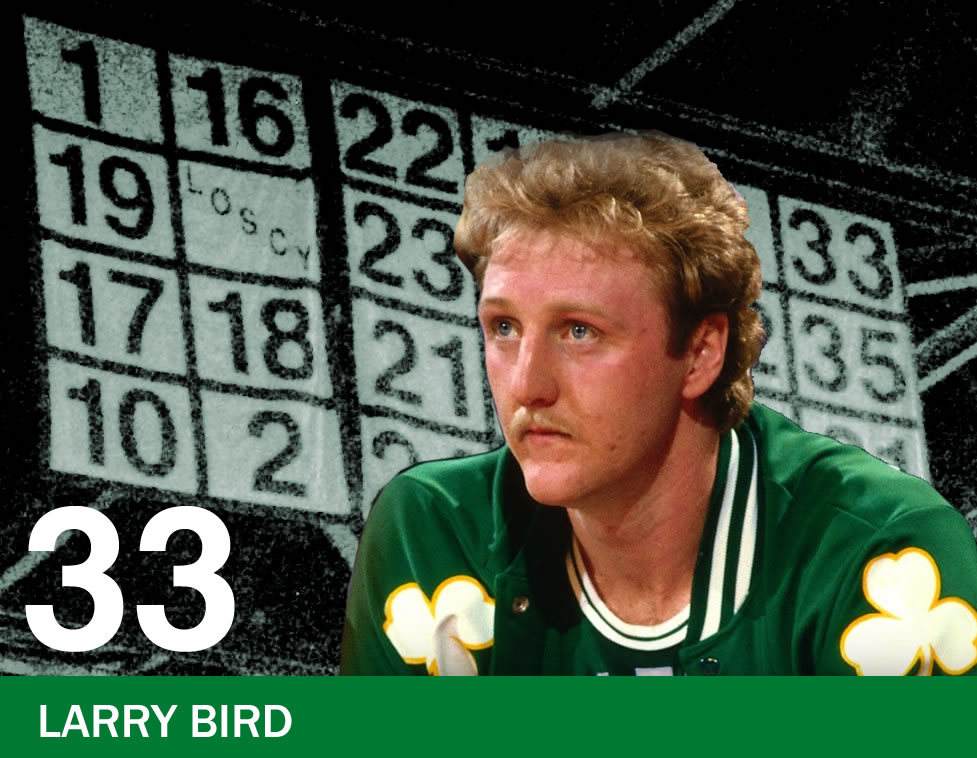From now until February 11, Red’s Army will be posting stories about the players behind the Celtics’ 22 retired numbers and that one retired nickname. Stories will be posted in the order that the numbers were retired.
Editor’s note: We’ve provided many links to videos (and a few articles) to enhance this look back at Number 33. Use caution or you’ll end up in a YouTube wormhole.
“Larry Legend.” It’s one of the best-ever NBA nicknames because Larry Bird’s skills, achievements and career were undeniably … legendary.
With Bird on your team, you were a legitimate championship contender every season. If you became a Celtics fans during the 1980s, it was probably because of Larry Joe Bird.

Bird grew up in a small Indiana town (his other nickname was The Hick from French Lick) and was recruited to Indiana University by coach Bobby Knight. However, Bird found he was uncomfortable in the big-time campus atmosphere, and dropped out. He returned to French Lick and actually worked on a garbage truck for a while.
Larry ended up playing three seasons at little-known Indiana State University. He averaged 30.3 points and 13.3 rebounds in his career as a Sycamore and was a two-time first-team All-American.
Because he hadn’t played that first year at Indiana, Bird was available for the 1978 NBA Draft while still retaining college eligibility. Bird was planning to play one more year at Indiana State, so drafting him was a risk – the team would lose his rights if they couldn’t sign him before the 1979 Draft.
But this was another instance of Red Auerbach being Red Auerbach. He surprised the league by grabbing Bird with the sixth pick in 1978. Among the teams that passed on Larry were the Knicks (no titles since 1973) and the Pacers (Indiana!).
To be fair, even Auerbach didn’t realize he’d drafted a future legend.
“I knew he was a great shooter, but I didn’t know how great,” said Red later. “I knew he was a great passer and rebounder, but I didn’t know how great. And I did not know he would play with injuries … Larry was the most self-motivated player I have ever seen.”
Drafting a player still in college created the unique circumstance of all Celtics fans suddenly having an NCAA team to root for in 1978-79. And Bird didn’t disappoint.
That season, Bird won numerous awards as collegiate player of the year. He carried Indiana State all the way to the NCAA championship game, before suffering their only loss of that season to Michigan State and Magic Johnson.
Obviously, Red did sign Bird to a Celtics contract. The 6’9” forward earned 1980 Rookie of the Year as Boston won 61 games (after just 29 wins the year before). Bird went on to play 13 seasons in Boston, six times winning more than 60 games. For his career, Bird averaged 24.3 points, 10.0 rebounds and 6.3 assists per game. He shot 49.6% from the floor, 37.6% on threes, and 88.6% on free-throws. He was also a rare two-time member of the 50-40-90 Club. He did all this with a noticeably crooked right pinky finger and a right index finger permanently damaged while playing softball in college.

Bird was the catalyst for Boston reaching the Finals five straight years and raising three championship banners at the Garden (1981, ’84 and ’86). The 1985-86 squad was arguably the best NBA team ever, at 67-15 for the season and 15-3 in the playoffs.
At the height of his powers, Larry was voted NBA Most Valuable Player from 1984 through 1986, joining only Bill Russell and Wilt Chamberlain as winners of three straight MVPs. Moreover, Bird finished top three in MVP voting for eight straight years.
Bird registered 59 triple-doubles in the regular season and another 10 in the playoffs. He was a 12-time All-Star and 10-times All-NBA (including nine on First Team). He was on the All-Defense Team three times. He won Finals MVP twice. He was a member of the original Dream Team, which won gold at the 1992 Summer Olympics. And he was inducted into the Hall of Fame in 1998.
One regret about Bird’s career is that he played before the emphasis on shooting three-pointers – only twice did he have more than 200 attempts in a season. But Larry Joe could sure hit them. He led the league in three-point makes twice, and won the three-point shootout at the All-Star Weekend three straight times – including once while famously still wearing his warmup jacket.
Injuries became as problem as Bird aged. He played only six games in the 1988-89 season due to surgery to remove bone spurs on both heels. He also was forced to retire sooner than he might have because of chronic back problems.
Bird was a world-class trash talker who never backed down from anyone. He reportedly injured his hand in a barroom fight during the 1985 playoffs. There was the infamous melee with Dr. J (the Doctor was miffed about Larry outscoring him, 42-6). And when Bill Laimbeer tackled Bird in a playoff game, Bird responded by drilling Laimbeer with the ball.
Of course, Larry’s top rival throughout his career remained Magic Johnson. After their NCAA meeting, they faced off in three NBA Finals. They were simply the best of the ’80s. The Celtics won three titles in that decade and the Lakers won five. If Bird and Magic had played in different eras, they each would’ve won many more.
Although, being linked was important, because Larry and Magic literally saved the NBA in the ’80s.
Thanks to the Russell vs. Chamberlain battles, the NBA had something of a golden age in the 1960s. But the league’s popularity dropped off in the ’70s. TV ratings were so low that Finals games were shown on tape delay, so CBS wouldn’t have to pre-empt prime time programming.
Bird and Magic changed all that. Because of their rivalry and charisma, and the narrative of blue-collar Beantown vs. glitzy Hollywood, whenever the Celts played the Lakers, it was an event. It was must-see TV. If not for the two superstars, the league might not have grown to what we have today.
It’s also pretty cool that Bird and Magic became close friends in “real life.” Their relationship began when they met off the court to shoot a Converse commercial. The story of their friendship has since been told in a book, a documentary and even a Broadway play.
If you were around during Bird’s dominance, you probably have a highlight reel in your head. Here are a few of the best memories:
- The passes he delivered. He was no doubt the best, most creative passing forward of all time.
- There was the epic (that’s the only word for it) duel with Dominique Wilkins in the fourth quarter of a playoff Game 7.
- The time he completed a triple-double by halftime. And the game at Utah, when he was within one steal of a quadruple-double in three quarters, but sat out the fourth in a blowout win.
- His 60-point game against Atlanta, where the shots he made were so outrageous that the Hawks on the bench were celebrating with him.
- The game in which he shot mostly left-handed, finishing with 47 points, 14 rebounds, 11 assists and the game-winner in overtime. (Little-known fact: Larry writes with his left hand. Even so…)
- His chemistry with Dennis Johnson.
- The (original) Big Three
And, of course, one of the most memorable clutch plays in NBA history.
[youtube https://www.youtube.com/watch?v=4LtBXYtgRpo?rel=0]Not to mention one of the most iconic TV commercials of all time.
[youtube https://www.youtube.com/watch?v=1shK-j_u6LI?rel=0]Even Bird’s number retirement was awesome, as the Celtics held a special night for him at a sold-out Garden.
Some years after Bird retired, he joined the Pacers organization. He was named head coach in 1997, won the 1998 Coach of the Year award, and took the Pacers to the Finals in 2000. He then walked away from coaching, and from the Pacers, only to return in 2003 as president of basketball operations. He went on to be named 2012 Executive of the Year. He resigned last year.
One last note: Bird is the only person to win NBA Rookie of the Year, MVP, Coach of the Year and Executive of the Year. It’s something that probably no one will ever duplicate, because a feat like that is … legendary.
[youtube https://www.youtube.com/watch?v=YW2sP1f-4hk?rel=0] [youtube https://www.youtube.com/watch?v=DWYOfv8pBgc?rel=0] [youtube https://www.youtube.com/watch?v=maS9smxRubI?rel=0]Bird’s playing stats at Basketball Reference
Bird’s coaching stats at Basketball Reference
Biography on Celtics.com Legends section
The retired numbers project:
Add The Sports Daily to your Google News Feed!
